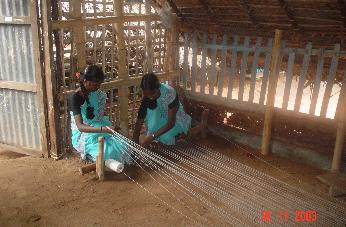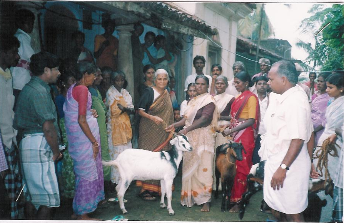from their specific goals, the projects create opportunities for promoting a sense of purpose, power and independence,
especially for women; create a new atmosphere of social cohesion though working together in community activities; and
generate participation between the beneficiaries, the government and the public in raising social standards of the poor
in society.
In its areas of operation, LAFTI advocates the formation of GRAMA SABHA (Village Community), MATHAR SANGH
(Women's Forum), Youth Forum and Labour Bank:
Village Community is the basic organisation at the village level whose members comprise all adult men and women
residents. It meets regularly to discuss problems and evolve action plans. It collects monthly contribution of Rs. 5
(Rupees) per family in a bank deposit towards the village common fund.
Women's Forum consists of all adult women. As the land title is given to women, they take active part in land
development and other programmes. These include child health, nutrition, sanitation, small savings, goatery, backyard
horticulture, etc.
LAFTI also organises Youth Forum, by recruiting the youths in each area for community actions e.g. for road laying,
planting of trees, construction of latrines.
A "Labour Bank", the total number of days offered by individuals for labour, is a collective pool for Grama Sabha to
utilise for community work e.g. repairing roads.
The Goat Project aims to offer minimal income to the landless poor whose sole source of income comes from farm
labour if and when this is available. It has been boosted by donations from the UK; each goat costs just over 10 sterling
pounds and so far 200 goats have been distributed to families; this is a self-generating scheme, with subsidised
repayments forming funds for further purchase and distribution of goats in each village community.
Proposal for a Combine Housing & Income Project is ready for funding. Under the scheme, each family is distributed
land for construction of a small house for dwelling and plantation of coconut trees for income generation; they are also
given a buffalo for milk production and breading. The costing for each unit is approximately Rs 60,000 (600 sterling
pounds), and LAFTI hopes to build 50 housing units in each area of its operation. The government subsidised housing
schemes and bank loans form the bulk of the funds for the project; negotiations with the local ONGC for subsidised
installation of a biogas and gobar (Eru fuel) plant, village community labour force and LAFTI's vocational training
workshops will all make this a worthwhile and feasible project.
The beneficiaries are expected to contribute in other ways to the wellbeing and welfare of the village community e.g.
building children's play ground, youth club; adult education classes, etc.



